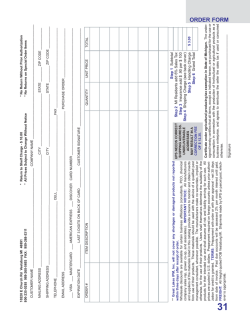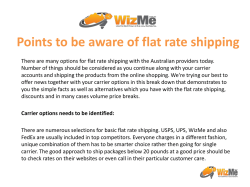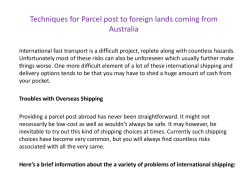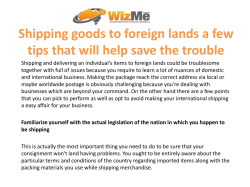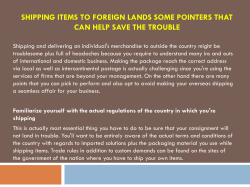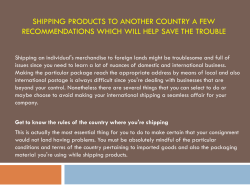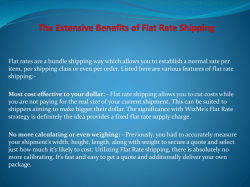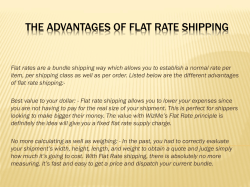
resumen ejecutivo
EU shipping competitiveness study International benchmark analysis Executive summary, February 2017 1 Maintaining and boosting the competitive position of the European shipping industry require a shift in policy priority The shipping industry in the EU is a highly mature industry and an economic giant in the European economy directly accounting for over 620,000 jobs.1 On the global level of shipping, the EU is still a large player compared to most regions in the world with 36.5 percent of owned gross world tonnage and 46.2 percent of operated world tonnage. An overall competitive regime for fiscal and social measures as well as quality registers and a strong skills base support the current status of the EU as a location for shipping activities. Current growth rates in the overall market share suggest that the EU remains competitive, but at the same time that there are clear signs that the competitiveness of EU shipping is under significant pressure. The EU is experiencing cases of relocation of activities as well as de-flagging, despite its ambition of the opposite, and its growth rates in terms of ownership and the tonnage operated are significantly lower than those of its competitors in for instance Asia. In this study commissioned by the European Community Shipowners’ Associations, Monitor Deloitte has identified a number of important policy gaps in the overall EU shipping policy framework on the basis of a benchmark study of five specific international shipping centres (Singapore, Hong Kong, Dubai, Shanghai and Vancouver). Through the comparison of the successful policies across eight competitiveness factors in those centres with EU policies, the policy gaps have been identified (see box on right). The study concludes that there is an overall solid – and highly important – EU policy framework facilitated by the Community Guidelines on State aid to maritime transport (SAGs) that has enabled a competitive position of EU shipping centres vis-à-vis competing non-EU shipping centres. But it is also concluded that there are EU policies making the EU less attractive to shipowners and to shipping activities and hence constituting policy gaps. Three gaps have been emphasised in this summary and form the basis for the key recommendations while further gaps have been described in the full report. Important policy gaps exist in an otherwise strong policy framework Firstly, in terms of taxation and fiscal incentives the current regime provides for a relatively competitive European shipping sector at its core. However, the EU framework is less competitive with regard to several elements, including the EU eligibility criteria relating to the flag requirement and the current ring-fencing of maritime activities applicable to tonnage tax put in place by the European Commission. Effective taxation at both corporate and shareholder level is a sine qua non condition to maintain a sizeable market share in international shipping. A second significant gap has been identified concerning the regulatory framework specifically relating to the application and legal status of the SAGs for competitiveness. It is a perceived weakness seen from the shipowners’ point of view that the EU’s – and often also the member states’ – interpretation of the SAGs is based on legal grounds, but lacks flexibility, whereas administrations in international centres are often much more pragmatic and business-friendly. This problem is reinforced by the fact that the SAGs are easily amendable by the European Commission and that there are 1 Oxford Economics, The economic value of the EU shipping industry – update, February 2017. 2 Competitiveness factors in the benchmark model Taxation and fiscal incentives Regulatory, economic and political factors Availability of professional services Skills Flag attractiveness Ease of doing business Legal framework for vessel exploitation Availability of finance no explicit periods of applicability. In a sector where most business decisions are long-term, these factors give rise to uncertainty due to a perceived risk of interpretive policy change. A third gap on flag attractiveness and the legal framework for vessel exploitation emanates from the regional legislation for international shipping that is introduced by the EU and entails different standards for EU flags and shipowners, causing additional administrative and technical requirements. Moreover, some EU registers still stipulate specific nationality requirements and crewing restrictions that also lead to increased administrative and economic burdens. Competitors, like Singapore, have strategies to ensure that national regulations do not go beyond the international standards and are, at the same time, considered a quality flag option. The consequence of the EU policy is that the competitiveness of EU flags is harmed as this leads to differences in operational costs and not quality. EU shipping policy must evolve and change to better support EU shipping at a global level Monitor Deloitte’s recommendations come at two levels: the overall perspective of shipping as a global industry and specific policies. Further recommendations are put forward in the report. Formulate a comprehensive and globally oriented shipping and maritime policy in the EU EU policies on short sea shipping must be complemented by a policy with a view to improve the EU’s competitiveness as a location for international shipping at a global level. While both short sea and global shipping are important markets, the largest share of EU shipping is international and crosstrading, carrying cargoes between third countries. Furthermore, the policy should be comprehensive by cutting across policy fields like transport, taxation, environment, etc, and thereby cover the key competitiveness factors. Improve legal clarity around the application of the SAGs The EU should increase the clarity around the applicability of the SAGs by clarifying the principles and objectives applied. While the SAGs should remain soft regulation, there is an apparent need for continued flexibility in the member state application of the guidelines – a one-size-fits-all model that drives out the particularities of individual member state shipping sectors would be very harmful to the competitiveness of EU shipping. Also, to the extent possible, the EU should aim at setting medium/long-term horizons for the applicability of the SAGs to induce increased legal certainty. Finally, the EU should not question previous decisions that were duly notified and approved. Assess and ease the flag link eligibility criteria for entering the tonnage tax regime Too rigid an insistence on the flag link eligibility criteria may be counterproductive as this could lead to increased operating costs or lack of market access. The EU should consider easing, or as a minimum not further restricting, the current flag link requirements set up in the SAGs as other important shipping centres do not have such requirements, which allows for more flexibility. Instead, the EU should maintain and focus on its requirements concerning strategic and commercial management activities. Deviating from or going beyond IMO/ILO conventions in EU and member state regulation should be prevented In order for the EU to offer competitive conditions for its flag states and shipping companies, deviating from or going beyond IMO/ILO conventions should be prevented. Furthermore, current regulation should be reviewed in 3 order to reduce unnecessary detailed and burdensome regulation. From a competitiveness perspective, it is important that the EU does not impose stricter regional regulations on top of global agreements. Implementation of regulations outside standards introduced by IMO/ILO will increase the operating costs relative to flag states, such as Singapore, pursuing regular implementation of IMO/ILO conventions, and should be avoided. 4 About Deloitte Deloitte provides audit, consulting, financial advisory, risk advisory, tax and related services to public and private clients spanning multiple industries. Deloitte serves four out of five Fortune Global 500® companies through a globally connected network of member firms in more than 150 countries and territories bringing world-class capabilities, insights and high-quality service to address clients’ most complex business challenges. To learn more about how Deloitte’s approximately 245,000 professionals make an impact that matters, please connect with us on Facebook, LinkedIn, or Twitter. Deloitte Touche Tohmatsu Limited Deloitte refers to Deloitte Touche Tohmatsu Limited, a UK private company limited by guarantee (DTTL), its network of member firms and their related entities. DTTL and each of its member firms are legally separate and independent entities. DTTL (also referred to as Deloitte Global) does not provide services to clients. Please see www.deloitte.com/about for a more detailed description of DTTL and its member firms. © 2017 Deloitte Statsautoriseret Revisionspartnerselskab. Member of Deloitte Touche Tohmatsu Limited. 5
© Copyright 2026
